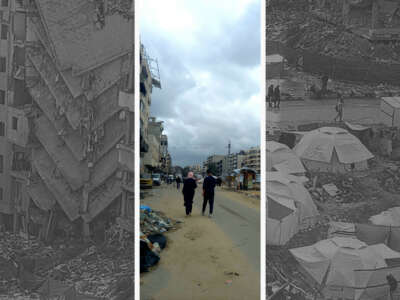Part of the Series
Struggle and Solidarity: Writing Toward Palestinian Liberation
In Gaza, every neighborhood carries traits that foster pride and unity among its residents, each one boasting its own unique qualities, cherished and known by all. One such neighborhood is Shujaiya, which means “courage” in Arabic. It is a place where the people are celebrated for their strength, resilience, patience and an unwavering love for their land. This love runs so deep that they would endure anything, even living with nothing but a tent for shelter, to remain on their land.
Now, however, the Israeli military is driving the residents of Shujaiya off their beloved land through a ground invasion. On April 4, weeks after breaking the ceasefire, Israel began attacking Shujaiya, displacing its residents, destroying the neighborhood, and preparing to annex it as a so-called “safe zone” under its full control – just as Israel did with Rafah.
I first came upon a group of people who were fleeing the ground invasion earlier this month as I trudged through the heart of the Rimal neighborhood in Gaza, which is just three kilometers (less than two miles) away from Shujaiya.
I was in Al-Rimal desperately searching for a place with internet access from which to take my university exams, when the streets were suddenly overwhelmed with chaos. The bombardment wasn’t happening in Al-Rimal, but I could tell it was close by. I could hear the deafening sound of tank shells and the crack of tank gunfire.
The air was thick with the frantic cries of the elderly and the heart-wrenching wails of children. I had no idea what was unfolding around me, but an overwhelming sense of dread consumed me.
It was as if I were caught in a battle, not just for survival, but for a dream I had fought so hard to keep alive: my graduation from university. Yet, with every step I took, I felt death’s shadow looming closer, threatening to rip that dream from my grasp. The weight of the unknown pressed down on me as I moved through the streets. I worried that, with each step, I was closer to losing everything — my education, my family. The fear felt suffocating, and all I could think was, “How much longer can I keep fighting before it’s all taken away?”
For a moment, curiosity overtook me. Who were these people who had suddenly flooded into the streets of Al-Rimal, and where were they fleeing from? In that instant, I realized that my education no longer mattered — this was a moment of life or death.
The night was vicious, the bombardment relentless. Listening to the tank fire, I knew this was no “ordinary “attack. I was sure I was listening to tanks targeting fleeing civilians, and that could only mean one thing: a ground invasion had begun.
At that moment I did not yet know that the ground invasion was in Shujaiya. But as I walked through the chaos, I came across a group of displaced people, their faces painted with fear and sorrow. Among them, I saw a woman, at least 60 years old, crying uncontrollably. Her voice rang out in agony, “They dragged us out at night… they forced us out.”
I approached the woman — who identified herself as Om Ali Abu Sabta — and asked what had happened. She told me through her tears, “They stormed in at night. We had no choice but to flee toward Al-Rimal. But where were we supposed to go? There is no shelter for us. Even the schools in the area are overcrowded, filled with people since the war began. Most of the homes have been destroyed.”
I couldn’t bring myself to say anything to her; I could only stare into her eyes, trying to convey how deeply I understood what she was feeling. Hearing her story, my own tragedy resurfaced in my mind. Like her, I too have faced displacement — at the beginning of the war, my home in Tal al-Hawa, a neighborhood in the northern part of Gaza, was destroyed by the Israeli military, and I had to flee from there to the neighborhood adjacent to it, Al-Rimal.
As I walked, I saw another displaced family setting up a tent on Palestine Street in Al-Rimal. I never imagined that the people of my city, once a symbol of dignity, would be forced to sleep on the streets.
Facing this suffering as I searched for internet access to take my university exam felt like another test: a test of endurance in this cruel life. How long can I bear these tragedies, and endure all that we are going through?
But we’ve long known the grim patterns of occupation: before every ground invasion, we’ve come to expect the military to unleash a wave of massacres to empty the neighborhoods by force.
On April 3, 2025, the night before its ground invasion in Shujaiya, the Israeli military launched an airstrike on Dar Al-Arqam School in the Al-Tuffah neighborhood of Gaza, which had been sheltering previously displaced residents of Shujaiya.
The result was a horrific massacre that left an indelible mark on all who witnessed it. The bodies of killed Palestinians were flung into the air in a scene that felt more like a nightmare than reality. When I watched the video recorded by journalists, an overwhelming fear consumed me. I could hardly believe my eyes as the bodies soared into the sky. The result was devastating: 31 people were killed and 100 were wounded. After committing this atrocity, the Israeli military issued an order for the complete evacuation of the school, then leveled it to the ground with a full-scale bombardment.
I know the horrors of a ground invasion all too well. Just eight months ago, I was trapped with my family in the Rimal neighborhood, surrounded by the Israeli army, unable to open a window without risking our lives. The moment the Israeli military knew we were there; death would be certain. The most terrifying moments came the day before they stormed in — when the relentless roar of tank shells tore through the air for endless hours.
Now it is the residents of Shujaiya who are enduring a ground invasion, reliving once again the same horrors they have faced in the past.
Shujaiya is one of the neighborhoods that has suffered the most from the occupation over the years. During the 2014 war, it endured relentless and intense artillery bombardment, and it was the only neighborhood to experience a large-scale ground assault. That attack forced around 100,000 people to flee to various parts of Gaza, where they endured unimaginable hardships. The assault resulted in a horrific massacre, claiming the lives of at least 67 people in Shujaiya in a single day, and leaving many others wounded. Among the victims were numerous children and women, making it one of the bloodiest chapters of the war — at least, before the tragedy that began in 2023.
And now people from Shujaiya are facing a ground invasion and massive displacement once again.
The Gaza Strip spans just 365 square kilometers. With every neighborhood devoured or destroyed, the noose tightens around the necks of more than 2 million people without water, food, shelter, or the ability to breathe freely… only a long, slow wait on the edge of an abyss.
I keep trying to convince myself that one day, my city will rise again, more beautiful than it ever was. I cling to that hope like a lifeline. But slowly, that hope is slipping through my fingers, and I’m starting to believe that seeing Gaza whole again might be an impossible dream. I wish that everything I’m living through right now were just a nightmare I could wake up from. Will the world wake up with us?
Whether it does or not, we still rise each day — not because we are fearless, but because courage is choosing to endure, again and again. We are not just survivors. We live, we love, we resist. Even when left with nothing but dust and broken dreams, we hold on.
That is shujaiya. That is courage.
Angry, shocked, overwhelmed? Take action: Support independent media.
We’ve borne witness to a chaotic first few months in Trump’s presidency.
Over the last months, each executive order has delivered shock and bewilderment — a core part of a strategy to make the right-wing turn feel inevitable and overwhelming. But, as organizer Sandra Avalos implored us to remember in Truthout last November, “Together, we are more powerful than Trump.”
Indeed, the Trump administration is pushing through executive orders, but — as we’ve reported at Truthout — many are in legal limbo and face court challenges from unions and civil rights groups. Efforts to quash anti-racist teaching and DEI programs are stalled by education faculty, staff, and students refusing to comply. And communities across the country are coming together to raise the alarm on ICE raids, inform neighbors of their civil rights, and protect each other in moving shows of solidarity.
It will be a long fight ahead. And as nonprofit movement media, Truthout plans to be there documenting and uplifting resistance.
As we undertake this life-sustaining work, we appeal for your support. We have 24 hours left in our fundraiser: Please, if you find value in what we do, join our community of sustainers by making a monthly or one-time gift.
Read full article at source
Stay informed about this story by subscribing to our regular Newsletter


